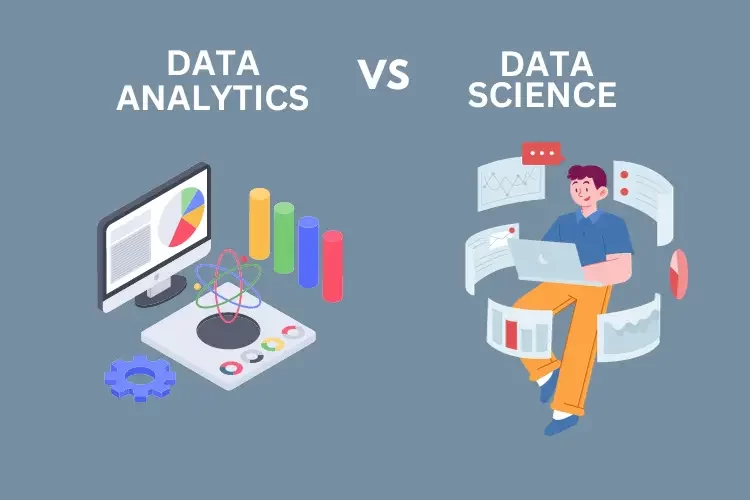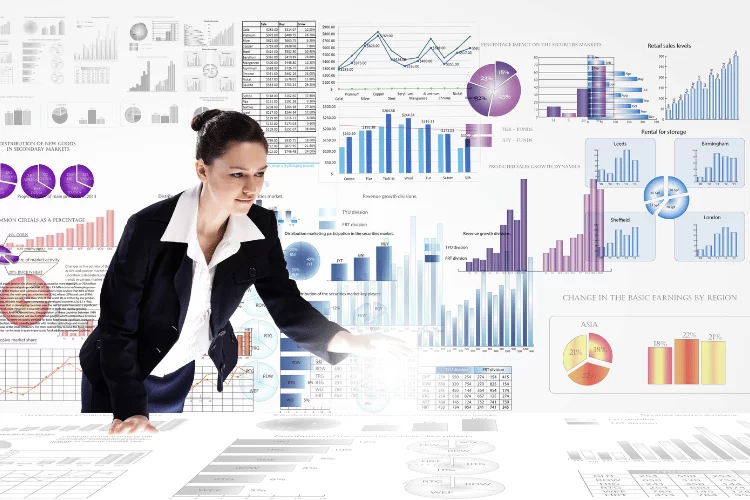Data Science and Data Analytics are terms that deal with and handle data. Converting chaos of data collected from multiple sources into useful information. Furthermore, it is used for either solving business problems or carrying out certain tasks to achieve business goals. Transforming data through data science includes data mining, data interference, predictive modelling, machine learning, algorithms etc. to extract trends and create patterns from complex datasets. In addition to it, data analytics includes various skills like statistics, mathematics, analysis etc. to study data and convert it into usable business tactics.

Data Science is a broader term in comparison to Data Analytics, as it focuses on finding useful results from large datasets, on the other hand, data analytics uncovers the visions. Data Analytics is a part or branch of data science. Let’s expand on their the differences from below-mentioned points:
| S.no | Basic of Difference | Data Science | Data Analytics |
| 1. | Meaning | It is a multidisciplinary field in which actionable insights are discovered from large sets of raw data. | It focuses on answering questions generated for making better decision making. |
| 2. | Scope | Macro | Micro |
| 3. | Skills | Mathematics, Advanced Statistics, Predictive Modelling, Machine Learning, and Programming Languages like R, Julia, Python, etc. | Knowledge of Intermediate Statistics, Tools like Python, SAS, R etc., SQL excel etc. |
| 4. | Job Role | Data Scientists, Data architects, Data engineers, Machine Learning specialists, and Statisticians. | Data Analyst, Business Analyst, Operations Analyst, Quantitative Analyst. |
| 5. | Tools and Programming Language | Python, R, Hadoop, TensorFlow, Azure Data lake. | Python, SAS, SQL, Power BI, MongoDB, Tableau. |
| 6. | Roles and Duties | Designing data modelling processes, and creating algorithms to extract the information from raw data. | Designing and maintaining data systems, interpreting and communicating trends, patterns etc., of datasets. |
| 7. | Big Data Usage | Yes, Higher usage | Yes, Lower usage |
| 8. | Application Areas | Machine learning, AI, search engine engineering, corporate analytics, digital advertisements. | Healthcare, gaming, travel, and industries with immediate data needs. |
| 9. | Objective | Ask the right questions to discover the right solutions or innovative solutions. | To find actionable data by using existing information. |
| 10. | Technical Knowledge | Higher Level | Lower Level |
| 11. | Nature of Work | Exploring, discovering, investigating And visualizing data. | Reporting, predicting, prescribing and optimizing data. |
| 12. | Types of Data | Handle all types of data, both structured and unstructured data | Handle or deal with structured data or semi-structured data. |
| 13. | Methods Used | Data sourcing, data cleaning, data modelling, results in evaluation, results testing and deployment. | Data querying, data wrangling, statistical modelling, data analysis, and data visualization. |
Summarizing all dissimilar points, data analysts examine large datasets toand develop trends, visual presentations to make strategies. Although data scientists design new data modelling, predictive analysis etc. and build new ways of solving problems. Data analysts utilize data to figure significant visions, on other hand, data scientists used to estimate the unexplained by asking the right questions, creating algorithms, using ,statistical tools etc., to prepare reports and communicate results in the form of patterns, trends, and forecasting for better decision making.

Once you can define clearly the differences between data science and data analytics. Also, you can identify which will be fitted for you.
To determine which path is best as per your personal and professional goals, you should consider the following factors to decide which is better for you:
Data Analysts and Data Scientists have different aspects related to duties and roles, career routes, training, skills, etc. It varies with individual choices and interests. You can consider the above-mentioned points to determine which career path will be best for you.
Furthermore, it is difficult to say that data science is better than data analysis. Both fields have different challenges and advantages.
However, data science has a broader scope than data analysis in the learning direction. But as I said it depends on individual to individual. Sometimes, candidates who love to play with numbers and facts analysis can earn more than those who have completed a master’s degree in data science. This is because former candidates have a clear understanding of their interests, education, concepts, etc., or have gained more skilled knowledge related to it than the latter.
Both data science and data analysts have huge demand in the market, it depends on the individual’s choice of which career path will be right for them. I will suggest you choose any career path after studying one’s goals, learning capabilities, and interests. After determining your goals, undertake proper training and guidance either from an online platform through online courses or from offline colleges, whatever suits your requirement.
I will recommend a data analyst role for those who want to start their career in analytics. A data scientist role is recommended for those who want to love to use machine learning models and deep learning techniques to ease human tasks.
We provide online certification in Data Science and AI, Digital Marketing, Data Analytics with a job guarantee program. For more information, contact us today!
Courses
1stepGrow
Terms
Anaconda | Jupyter Notebook | Git & GitHub (Version Control Systems) | Python Programming Language | R Programming Langauage | Linear Algebra & Statistics | ANOVA | Hypothesis Testing | Machine Learning | Data Cleaning | Data Wrangling | Feature Engineering | Exploratory Data Analytics (EDA) | ML Algorithms | Linear Regression | Logistic Regression | Decision Tree | Random Forest | Bagging & Boosting | PCA | SVM | Time Series Analysis | Natural Language Processing (NLP) | NLTK | Deep Learning | Neural Networks | Computer Vision | Reinforcement Learning | ANN | CNN | RNN | LSTM | Facebook Prophet | SQL | MongoDB | Advance Excel for Data Science | BI Tools | Tableau | Power BI | Big Data | Hadoop | Apache Spark | Azure Datalake | Cloud Deployment | AWS | GCP | AGILE & SCRUM | Data Science Capstone Projects | ML Capstone Projects | AI Capstone Projects | Domain Training | Business Analytics
WordPress | Elementor | On-Page SEO | Off-Page SEO | Technical SEO | Content SEO | SEM | PPC | Social Media Marketing | Email Marketing | Inbound Marketing | Web Analytics | Facebook Marketing | Mobile App Marketing | Content Marketing | YouTube Marketing | Google My Business (GMB) | CRM | Affiliate Marketing | Influencer Marketing | WordPress Website Development | AI in Digital Marketing | Portfolio Creation for Digital Marketing profile | Digital Marketing Capstone Projects
Jupyter Notebook | Git & GitHub | Python | Linear Algebra & Statistics | ANOVA | Hypothesis Testing | Machine Learning | Data Cleaning | Data Wrangling | Feature Engineering | Exploratory Data Analytics (EDA) | ML Algorithms | Linear Regression | Logistic Regression | Decision Tree | Random Forest | Bagging & Boosting | PCA | SVM | Time Series Analysis | Natural Language Processing (NLP) | NLTK | SQL | MongoDB | Advance Excel for Data Science | Alteryx | BI Tools | Tableau | Power BI | Big Data | Hadoop | Apache Spark | Azure Datalake | Cloud Deployment | AWS | GCP | AGILE & SCRUM | Data Analytics Capstone Projects
Bangalore:
Anjanapura | Arekere | Basavanagudi | Basaveshwara Nagar | Begur | Bellandur | Bommanahalli | Bommasandra | BTM Layout | CV Raman Nagar | Electronic City | Girinagar | Gottigere | Hebbal | Hoodi | HSR Layout | Hulimavu | Indira Nagar | Jalahalli | Jayanagar | J. P. Nagar | Kamakshipalya | Kalyan Nagar | Kammanahalli | Kengeri | Koramangala | Kothnur | Krishnarajapuram | Kumaraswamy Layout | Lingarajapuram | Mahadevapura | Mahalakshmi Layout | Malleshwaram | Marathahalli | Mathikere | Nagarbhavi | Nandini Layout | Nayandahalli | Padmanabhanagar | Peenya | Pete Area | Rajaji Nagar | Rajarajeshwari Nagar | Ramamurthy Nagar | R. T. Nagar | Sadashivanagar | Seshadripuram | Shivajinagar | Ulsoor | Uttarahalli | Varthur | Vasanth Nagar | Vidyaranyapura | Vijayanagar | White Field | Yelahanka | Yeshwanthpur
Other Top Cities:
Mumbai | Pune | Nagpur | Delhi | Gurugram | Chennai | Hyderabad | Coimbatore | Bhubaneswar | Kolkata | Indore | Jaipur and More